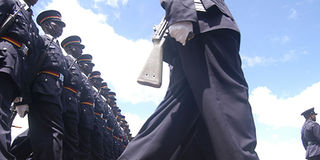Saitoti to unveil new police course

FILE | NATION
Officers marching during their pass-out parade.
What you need to know:
- Curriculum lays less emphasis on physical drills, is people-friendly and intelligence-driven
The long-awaited police training curriculum will be unveiled on Monday to pave way for the recruitment of police officers.
According to the report of the national task force on police reforms, the curriculum is people-friendly, intelligence-driven and lays less emphasis on physical training.
It was designed by the Kenya Institute of Education (KIE) officials, police college instructors and policing experts seconded by the Swedish government.
In drafting the curriculum, the team went to the public, the Judiciary, and several courts and even to the prisons to collect views.
Internal Security minister Prof George Saitoti will preside over the unveiling of the curriculum at the Kenya Airways’ Pride Centre, Embakasi.
The chairman of Police Reforms Implementation Commission (PRIC) Titus Naikuni, Police Commissioner Mathew Iteere and his AP counterpart Kinuthia Mbugua will attend the occasion. PRIC was appointed in January last year to oversee police reforms.
The new curriculum is part of the ongoing police reforms and some of the major changes are in the duration of training and the content.
Initially police used to train for six months and this was later changed to nine months. This left a lot of gaps as the period was extended without a corresponding review in the curriculum.
The recruits will now be required to undergo 15 months of intensive training, including a compulsory three-month internship.
At least 10 per cent of the recruits in both services will be degree holders and they will now train for 21 months, in four phases.
They will graduate as Assistant Inspectors but, officers who do not meet the full conditions for appointment to the rank will be considered as Non-Commissioned Officers (NCO) subject to a review after six months.
With the introduction of other units in the curriculum, the officers are expected to be more adept at managing complicated crime environments they operate in.
The trainees will also be taught criminology, disaster and incident management, sociology, psychology, skills at arms.
The traffic course shall be taught across all the three units – regular police, GSU and the AP. The recruits will also be trained on management and leadership, research and innovations.
The last police recruitment was in 2008, before the Ransley Commission recommended a moratorium on the recruitment, to pave way for comprehensive police reforms.
The minimum grade for joining the service has been raised to C plain in the Kenya Certificate of Secondary of Education examination.
However, in exceptional cases where a district does not meet its quota, candidates with C minus may be considered on the merits of each case and with approval of PRIC.
Public relations and customer care courses will also be taught in detail. The Kenya police reforms task force formed in April 2003 recommended, among others, that the two subjects be taught to the police to enable them change their negative attitude towards the public.



